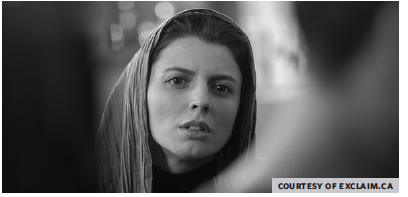
With each passing day, it seems that across the Middle East, tensions increase, more blood erupts, and sectarian warfare inflates, propelled by ideas and concepts that are set at separate extremes.
Centuries from now, history classes may use modern cinema to validate the realities of our existence, both as artistic documentation and as a subjective take on our daily problems.
York film professor John Greyson remains detained in Egypt under accusations of accompanying a pro-Morsi assault on a police station. The media makes many references to Greyson’s potential desire to make a documentary in Gaza, and it goes to show how the Middle East is not a safe place for a filmmaker to build a dream.
The cinema of the Middle East is taking form in parallel to its politics. The films are an antithesis of Hollywood endings, the best ones often ending in a question rather than providing an answer. To help you cope with and comprehend the Middle Eastern disaster better, here are five films worth watching to help uncover the uncomfortably unknown.
5. Ajami (2009)
This film, evocative of Crash, was Israel’s first submission of an Arab-language film for the Academy Award for Best Foreign Language Film.
The term “Ajami” has historical roots in the Arab language defining a non-Arab. As second-class citizens living in the impoverished Christian and Muslim neighbourhoods of Tel-Aviv, the film’s characters struggle to cope with their unfortunate lives and situations in this open-ended plot. The film’s depiction of class struggle, race, and patriarchy alongside crime, corruption, and irony are ultimately bleak, but also enlightening.
4. Lemon Tree (2008)
Another heartbreaker, Lemon Tree follows the story of Salma, a Palestinian widow who tends a lemon grove passed down through generations.
As a result of political consequences, the Israeli defense minister and his wife settle across from Salma in an area placed right on the borderline of Israel and the West Bank.
The film won the Audience Awards at Berlinale and received great reviews on its portrayal of the Arab-Israeli conflict.
3. Precious Life (2010)
This documentary follows the life of ill Palestinian child Muhammad, his mother Raida, an unknown Israeli sponsor of Muhammad’s hospital bills, and Dr. Somech, who contacted Shlomi Eldar, the director, to see if he could raise awareness for Muhammad’s case.
The film takes on a serious political undertone when Raida is cornered by Eldar after good news about her son; in fear of her portrayal in Arab media, Raida wishes her son a path of martyrdom in the capture of Jerusalem.
Although at times he plays an irksome participatory role, the director does a fantastic job intensifying the Israeli-Palestinian dilemma through the lives of his subjects, himself, and the violent wars between the two sects.
2. A Separation (2011) Another open-ended plot, the story follows the struggles families go through in the Middle East with regards to immigration and leaving behind their homelands.
Prominent Iranian actress Leila Hatami takes on the role of Simin, a mother and a wife who has arranged for the family’s departure. Her husband Nader refuses to leave his homeland and his elderly father, who is suffering from Alzheimer’s.
A Separation was the first Iranian film to win the Academy Award for Best Foreign Language Film.
A Separation is a must-watch at this time, especially with the thought of the Syrian refugee and displacement crisis in mind.
To leave or not to leave? That is the question for the many citizens of the Middle East with the financial option to leave their homeland in hopes of a better future.
1. Where Do We Go Now (2011)
Lebanese director Nadine Labaki is the only one to bring forth a message of hope and reconciliation for the Middle East with her film, a Lebanese, French, Italian, and Egyptian co-production.
Unfortunately for us, the plot is based on a fictional story.
In a small Lebanese village inhabited by both Muslims and Christians, the women of the village try to keep the peace between the men as civil war between the two sects take over the rest of the country.
Through comedy, romance, and tragedy, Labaki who also stars as the female lead, is able to capture a sentimental harmony through beautiful cinematography, musical arrangements, and spectacular writing.
Azad Imanirad
Contributor
Middle East: capturing the inertia through the lens


